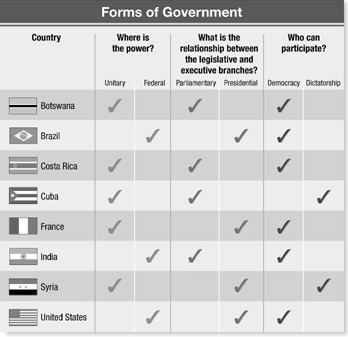Matching
|
|
|
IDENTIFYING KEY TERMS
Match each item with the correct statement
below. You will not use all the terms. a. | constitution | b. | executive
power | c. | unitary government | d. | parliamentary government | e. | presidential
government | f. | legislative power |
|
|
|
1.
|
A ____ is the body of fundamental laws setting out the principles, structures,
and processes of government.
|
|
|
2.
|
A ____, often described as a centralized government, is one in which all powers
held by the government belong to a single, central agency.
|
|
|
3.
|
Under a ____, the government must resign if it receives a “vote of no
confidence.”
|
|
|
4.
|
____ is the power to make law and frame public policies.
|
Modified True/False
Indicate
whether the statement is true or false. If false, change the identified word or phrase to make
the statement true.
|
|
|
IDENTIFYING KEY TERMS
|
|
|
5.
|
In a dictatorship supreme authority rests solely with the people.
_________________________
|
|
|
6.
|
Government is the process of accommodating different needs and
viewpoints. _________________________
|
|
|
7.
|
Population, territory, government, and sovereignty are the defining
characteristics of a(n) autocracy. _________________________
|
|
|
8.
|
"Government of the people, by the people, for the people" describes a
system of government in which the people are sovereign. _________________________
|
Multiple Choice
Identify the
choice that best completes the statement or answers the question.
|
|
|
MAIN IDEAS
|
|
|
9.
|
Among the broad purposes of the United States government spelled out in the
Preamble to the Constitution is the obligation to
a. | keep the executive and legislative branches of government
separate. | b. | create an autocratic form of government. | c. | defend the country
against Americans who oppose its policies. | d. | provide for justice and the people's
general welfare. |
|
|
|
10.
|
Locke, Harrington, Hobbes, and Rousseau would most likely agree that
a. | the state developed out of force. | b. | those of royal birth should rule the
state. | c. | the state exists to serve the will of the people. | d. | government should be
eliminated. |
|
|
|
11.
|
The theory underlying modern democracies was developed to challenge the idea
that
a. | those of royal birth have absolute authority to rule. | b. | the people as a
whole are the sole source of political power. | c. | the head of a family, clan, or tribe has the
natural right to govern. | d. | the strongest person or group has the right to
control others by force. |
|
|
|
12.
|
The dominant political unit in the world today is the
a. | government. | b. | nation. | c. | Constitution. | d. | state. |
|
|
|
13.
|
A federal government is one in which
a. | all power is concentrated in the central government. | b. | limited powers are
assigned to a central agency by independent states. | c. | power is divided between a central government
and local governments. | d. | powers are divided between a legislative branch
and an executive branch. |
|
|
|
14.
|
Which of the following statements is NOT true of parliamentary
government?
a. | The executive is chosen by the legislature. | b. | The legislature is
subject to the direct control of the executive. | c. | The prime minister and cabinet are part of the
legislative branch. | d. | The prime minister and cabinet must resign if
they lose the support of a majority of the legislature. |
|
|
|
15.
|
The individual 50 States lack which basic characteristic of a state?
a. | government | b. | sovereignty | c. | Constitution | d. | defined
population |
|
|
|
16.
|
The Internet seems especially suited to satisfy which of these needs in a
democracy?
a. | to control the lives of citizens | b. | to be informed about the many different
institutions and policies of the government | c. | the need for accurate, and always reliable,
information on which to base decisions | d. | the need for an uneducated elite to run the
government |
|
|
|
INTERPRETING TABLES
Use the chart to answer the following
questions.

|
|
|
17.
|
Government in which power is limited to a single person or very small group
exists in
a. | Cuba. | b. | Costa Rica. | c. | the United
States. | d. | Brazil. |
|
|
|
18.
|
Which form of government does Cuba, Costa Rica, and France have in
common?
a. | parliamentary | b. | democratic | c. | unitary | d. | dictatorial |
|
|
|
19.
|
Which characteristic do the United States and Botswana have in common?
a. | Both countries are democratic. | b. | Both countries have a presidential form of
government. | c. | Both countries have a unitary form of government. | d. | Both countries have
parliamentary governments. |
|
|
|
20.
|
All of the following countries are democracies EXCEPT
a. | France. | b. | India. | c. | Syria. | d. | Brazil. |
|